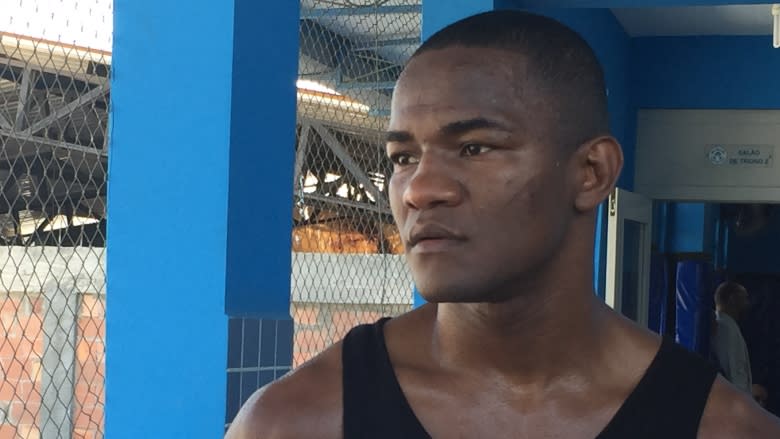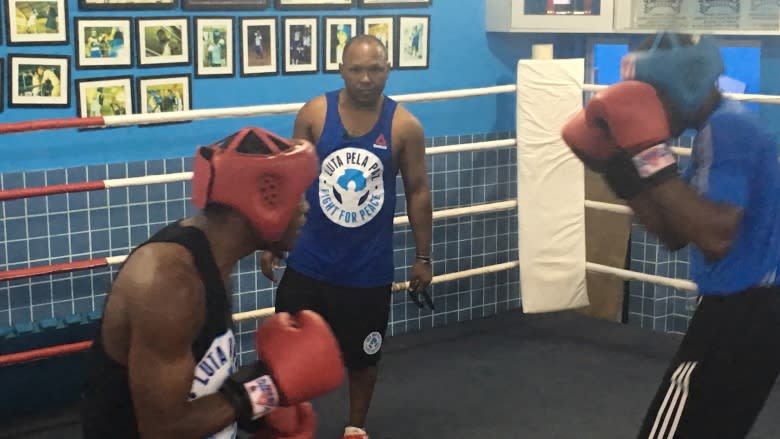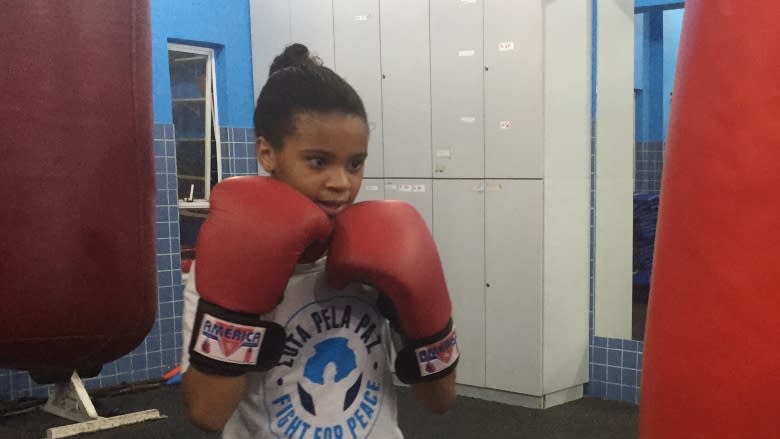'I wanted change': Some in Rio favela hoped for more from Olympics
Only days after criminals in the favela of Maré ambushed a wayward Brazilian state police car, killing two officers, a boxing club in the same favela carried on with kids' training.
The boxing club, called Fight for Peace, stands in stark contrast to the shooting wars in some of Rio's most violent favelas — violence that continued unabated during the Olympics.
On the day CBC visited, we were picked up at a gas station on the outskirts and ferried inside the favela in a car clearly marked with the club's name, passing a gun-toting resident at a checkpoint.
Roberto Custodio, 29, is one of the boxing club's top-ranked fighters. The Games, he said, made no dent in his community's daily battle with violence and drug crime.
"I think it will deliver a good legacy to Rio de Janeiro, good fruits to our city. But when it comes to the [favelas], I can't say the same. I don't see any changes."
But when he talks about carrying the Olympic torch and nearly making the boxing team, a smile breaks across his face and his eyes light up.
"It was a remarkable moment in my life," a close second to the day his daughter was born, he says.
"My goal was to get to the Olympics, participate, win an Olympic medal. And my Olympic medal this time was the Olympic torch."
Such is the Olympic legacy in Rio. Visible changes like better transport and the facelift to the city's downtown are clear and obvious improvements. But they don't address the city's biting poverty, its sanitation problems or its crime.
Many feel as Roberto does — caught between inspiration and disappointment.
The boxing and martial arts club Fight for Peace was founded in Rio in 2000 by an ex-amateur boxer, Luke Dowdney. In 2007, it opened a second academy in East London, U.K., and then expanded to 150 places.
At Sunday's closing ceremony, Fight for Peace was featured by the International Olympic Committee.
At three separate clubs in Maré, youth can box, train in judo, improve their education and get access to job training opportunities.
There are simple rules, says Carol Belo da Silva. First, nothing they learn about martial arts or boxing can be used in street fighting outside the club. Second, live the symbol on the T-shirt — fight FOR peace.
Da Silva is deeply disappointed in the Olympic investment priorities. "We see so much being spent that could have been reserved for other areas."
"We expected a lot more — investment in infrastructure and sanitation here, we expected that but nothing happened."
As she speaks to CBC, a young man outside the club gate watches, cellphone in hand, keeping an eye on the crew.
"We tell them, you're just interested in the boxing program," she explains, not the drug traffickers.
Inside the gym, Miriam Cruz Parga, a slight young woman, pounds a punching bag as if it were an assailant. She jabs and dances, sending it swinging. Miriam is 29, with a 13-year-old son. She quit school at 10 to help her mother clean houses.
"Boxing has changed my life in many ways. I had no childhood. I had to help my mom since I was very little."
She started boxing, at first to lose weight. "I was a little chubby." Now, there's hardly a gram of body fat on her small frame. She's working on getting her Grade 7 here.
"Through boxing, I've had a lot of opportunities, studying and being a different person for my son. I want to be an inspiration for my son. Because he's also part of the boxing." But in typical teenaged fashion, he won't spar with her.
"He's a competitor, too. He's got 23 fights," she says proudly. And herself? "Twenty."
Sport in the favelas is one of the few positive influences outside of family. The temptation is strong to be drawn into the drug trafficking culture and drug lords recruit young.
"My biggest fear," says Miriam, "is to let my son loose on the streets around here."
The second week of the Olympics was one of the worst times, as police tried to corral the violence inside the favela to prevent it from spilling out, threatening the Games.
"It's always worrisome because you're afraid to go out. You don't know if you will be the next victim of a stray bullet. You're not sure if you'll make it back home."
'We're scared'
Rather than big beautiful new sporting venues in another quadrant of the city, she wanted change nearer home.
"I wish we were able to walk around free. Because there are places we can't pass through. We're scared."
She fears being caught in the crossfire, "My main concern is, like, when the police come in, they don't respect the inhabitants. They think everybody is a thief."
Like Roberto, she's disappointed with the so-called Olympic legacy. But the sport itself – that was different.
"I saw boxing," she smiles. "It was marvelous. I wanted to go again to watch the women."
Miriam, who started boxing just four years ago, can see a goal. Would she strive to go to the next Olympics?
"For sure," she says quickly, her shyness giving way to enthusiasm. "I was very emotional. I'd love to be part of it. It looks so good!"










